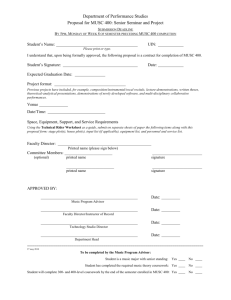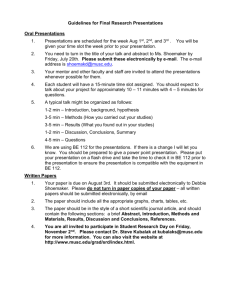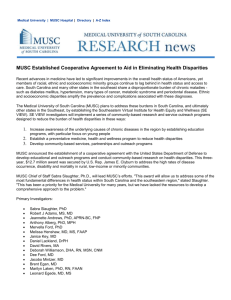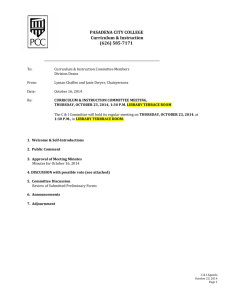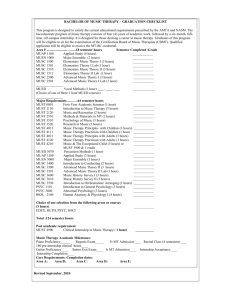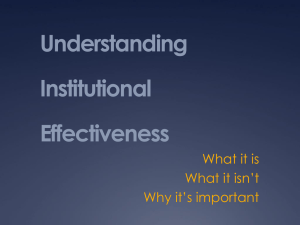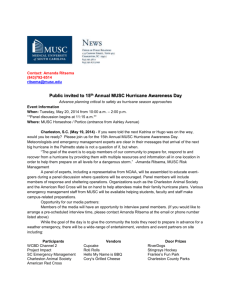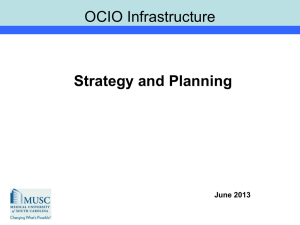Stephen W - East Carolina University
advertisement
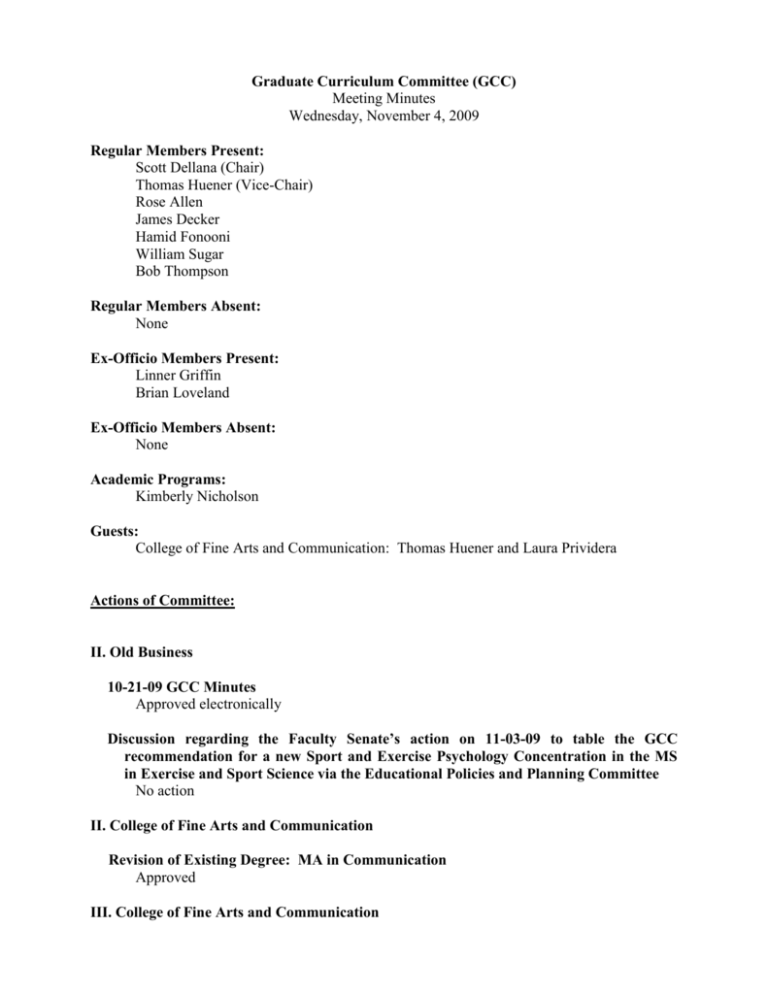
Graduate Curriculum Committee (GCC) Meeting Minutes Wednesday, November 4, 2009 Regular Members Present: Scott Dellana (Chair) Thomas Huener (Vice-Chair) Rose Allen James Decker Hamid Fonooni William Sugar Bob Thompson Regular Members Absent: None Ex-Officio Members Present: Linner Griffin Brian Loveland Ex-Officio Members Absent: None Academic Programs: Kimberly Nicholson Guests: College of Fine Arts and Communication: Thomas Huener and Laura Prividera Actions of Committee: II. Old Business 10-21-09 GCC Minutes Approved electronically Discussion regarding the Faculty Senate’s action on 11-03-09 to table the GCC recommendation for a new Sport and Exercise Psychology Concentration in the MS in Exercise and Sport Science via the Educational Policies and Planning Committee No action II. College of Fine Arts and Communication Revision of Existing Degree: MA in Communication Approved III. College of Fine Arts and Communication Revision of Existing Degree: MM in Music Education Approved as amended (1.) Revise faculty section (2.) Replace all references to “theory/composition” to “theory-composition” (3.) Replace all references to “secondary area of emphasis” to “area of emphasis” (4.) Replace all references within the areas of emphasis to the term “core” with “required” IV. College of Fine Arts and Communication Proposal of New Course: MUSC 6658 Approved as amended (1.) Revise affected degrees or academic programs (2.) Revise assignments and grading Renumbering and Revision of Existing Courses: MUSC 5406 (to 6101), 5416 (to 6116), 5426 (to 6126), 5436 (to 6136) Approved as amended (1.) Revise requested action (2.) Revised justification (3.) Revise affected degrees or academic programs (4.) Revise computer resources (5.) Revise assignments and grading (6.) Revise marked catalog copy V. New Business None Marked Catalog Copy: III. College of Fine Arts and Communication School of Communication http://www.ecu.edu/cs-acad/grcat/COMM.cfm SCHOOL OF COMMUNICATION Linda G. Kean, Director, 102 Joyner East Laura C. Prividera, Interim Associate Director, 102 Joyner East The School of Communication offers a master of arts in communication with an emphasis in health communication. Admission to this program requires that the applicant meet the admissions requirements of the Graduate School, as well as the School of Communication. MA IN COMMUNICATION The MA in communication prepares students for careers or advanced academic training in communication with an emphasis in health communication focusing on interpersonal communication and the media. The 30-hour program provides students with a thesis or nonthesis option. 1. Core:…………………………………...………..……………………………… 18 s.h. COMM 6000, 6030………………………………………………6 s.h. COMM 6230 (required for health communication emphasis)…...3 s.h. Choose 9 s.h. from the following courses (required for the health communication emphasis):………………………..9 s.h. COMM 6210, 6220, 6221, 6224, 6240 2. Options: …………………………………………………………………………..12 s.h. a. Thesis: COMM 7000………………………………………………3-6 s.h. *Electives (COMM or related areas)……………….……..6-9 s.h. b. Non-thesis: *Electives (COMM or related areas)……………………….12 s.h. 3. Successful completion of comprehensive exams or thesis. *Electives are chosen in consultation with the graduate program coordinator. Courses in related areas (outside of COMM) must be at the 5000 level or above. A maximum of 3 s.h. may be taken at the 5000 level. 6000. Communication Theory (3) P: Admission to MA in communication or consent of graduate program coordinator. Examination and analysis of principal communication theories, including interpersonal, intercultural, organizational, small group communication and media. 6030. Research Methods (3) P: Admission to MA in communication or consent of graduate program coordinator. Qualitative and quantitative methodologies used in the field of communication. 6031. Communication Pedagogy (3) P: Admission to MA in communication or consent of graduate program coordinator. Focuses on communication education, research, theory, and application. 6110. Media Effects (3) P: Admission to MA in communication or consent of graduate program coordinator. Survey of psychological and sociological effects that media has on attitudes, knowledge, values and behaviors. 6120. Interpersonal Communication (3) P: Admission to MA in communication or consent of graduate program coordinator. Impact of research and theory on academic and pragmatic issues in communication and relationships. 6124. Organizational Communication (3) P: Admission to MA in communication or consent of graduate program coordinator. History of organizational communication with emphasis on current research and practice. 6131. Social Influence (3) P: Admission to MA in communication or consent of graduate program coordinator. Examination and application of social influence communication theories, practices, effects and ethics. 6140. Special Topics in Communication (3) P: Admission to MA in communication or consent of graduate program coordinator. Examination of new or advanced topics in communication. 6141. Independent Study (3) P: Admission to MA in communication or consent of graduate program coordinator. May be repeated for a maximum of 6 s.h. Directed study of communication research and practice. 6210. Media and Health Communication (3) P: Admission to MA in communication or consent of graduate program coordinator. Theory and research of issues involving media and health. 6220. Interpersonal Health Communication (3) P: Admission to MA in communication or consent of graduate program coordinator. Theories and practices in various health care contexts, with emphasis on relationships among patients and health care providers. 6221. Intercultural Communication in Health Contexts (3) P: Admission to MA in communication or consent of graduate program coordinator. Intercultural communication theory and research as they apply to health contexts. 6224. Communication and Health Organizations (3) P: Admission to MA in communication or consent of graduate program coordinator. Analysis and practice of communication in health care settings. 6230. Introduction to Health Communication. (3) P: Admission to MA in communication or consent of graduate program coordinator. Introduction to the area of health communication covering interpersonal, organizational and media issues. 6240. Special Topics in Health Communication. (3) P: Admission to MA in communication or consent of graduate program coordinator. Examination of new or advanced topic in health communication. 7000. Thesis (3) P: Admission to MA in communication or consent of graduate program coordinator. May be repeated. May count a maximum of 6 s.h. toward the degree. 7001. Thesis: Summer Research (1) P: Admission to MA in communication or consent of graduate program coordinator. May be repeated. No credit may count toward degree. Students conducting thesis research may only register for this course during the summer. IV. College of Fine Arts and Communication School of Music http://www.ecu.edu/cs-acad/grcat/MUSC.cfm SCHOOL OF MUSIC J. Christopher Buddo, Director, A-118, A. J. Fletcher Music Center Susan Beck-Frazier, Assistant Director for Student Services, A-122 A, A. J. Fletcher Music Center Christopher Ulffers, Assistant Director for Administrative Support, A-119B, A. J. Fletcher Music Center Henry Doskey, Chairperson, Keyboard Music, A-376, A. J. Fletcher Music Center Janette Fishell, Chairperson, Keyboard Music, A-312, A. J. Fletcher Music Center Michelle Hairston, Chairperson, Music Education, A-213, A. J. Fletcher Music Center Thomas J. Huener, Chairperson, Theory, Composition, and Musicology, A-301, A. J. Fletcher Music Center Robert Scott Carter, Chairperson, Instrumental Music, A-307, A. J. Fletcher Music Center John B. O’Brien, Chairperson, Vocal Studies, A-268, A. J. Fletcher Music Center Sharon Munden, Chairperson, Vocal Studies, A-267, A. J. Fletcher Music Center The School of Music offers four three master of music degrees: the MM in music education, the MM in music therapy, the MM in performance, and the MM in theory-composition. The MM in music education has two seven options, each focusing on an area of emphasis, one is six are approved for North Carolina teacher licensure. The MM in performance offers concentrations in accompanying; organ, piano, voice, strings, percussion, or wind instruments; sacred music; woodwind or brass specialist; choral conducting; jazz; instrumental conducting; and pedagogy (piano, string, or vocal). The MM in theory-composition offers concentrations in composition (traditional and electronic), and theory. Students completing any of these professional degree programs achieve a broad conceptual understanding of their major area through a synthesis of theoretical and historical information. They acquire applied skills in research and performance for meaningful and effective use of this knowledge. ADMISSION Applicants must meet the requirements established by the Graduate School and complete its admission process. Applicants must have the equivalent of a bachelor of music degree from an accredited institution, a minimum average grade of B in all previous course work, and demonstrate an acceptable level of musical accomplishment through an audition. Portfolio admission is an option in music education and music therapy. As part of the admission process, all applicants must demonstrate a basic knowledge of music history and theory with an acceptable evaluation on an examination administered at the time of the audition or interview. Students with identified deficiencies may be required to remediate with appropriate courses (MUSC 6206, 6216). All applicants for the music education master of music program must submit a teaching license. Applicants in theory/composition must submit examples of their creative and scholarly work (compositions, research, or analytical papers). Students applying for other thesis programs (music therapy, music technology) must submit examples of creative and scholarly work appropriate to those areas. The master of music degree shall be awarded only after candidates pass a comprehensive examination that includes the presentation and defense of a final project. All applicants must meet the requirements established by the Graduate School and complete its admission process. Applicants must have the equivalent of a bachelor of music degree from an accredited institution and a minimum average grade of 3.0 in all previous course work. As part of the admission process, all applicants must demonstrate a basic knowledge of music history and theory with an acceptable evaluation on an examination administered at the time of the audition or interview. Students with identified deficiencies may be required to remediate with appropriate courses (MUSC 6206, 6216). All applicants for the MM in music education must submit a portfolio as detailed in the School of Music Graduate Handbook. Applicants for the MM in music education with emphases in pedagogical studies, choral or instrumental conducting, performance, or theory/composition must submit a current music teaching license. Applicants for all concentrations within the MM in performance must demonstrate an acceptable level of musical accomplishment through an audition. Applicants for the MM in theory/composition must submit examples of creative and scholarly work such as compositions, research, or analytical papers. The master of music degree shall be awarded only after candidates pass a comprehensive examination that includes the presentation and defense of a final project or thesis. All candidates for master of music degrees shall participate in conducted or coached ensembles as determined by individual degree area requirements. Additional information detailing specific requirements for the various degree programs can be found in the admission requirements section of the School of Music Graduate Handbook. MAT IN MUSIC EDUCATION Please refer to Section 8, College of Education, for the degree requirements for the master of arts in teaching, which leads to advanced certification. MM in Music Education Top Minimum degree requirement is 36-39 s.h. as follows: One week before the comprehensive examination presentation, the student will be required to complete a written examination of work covered in the degree program. The written examination is to be scheduled with the department chair. 1. Core - 16 s.h. MUSC 6836, 6837, 6838, 6839, 6977 2. Option (Choose option A or B.) - 20-23 s.h. Option A (Approved for North Carolina Graduate Teacher Licensure) - 20-23 s.h. Teacher education: EDUC 6001 - 3 s.h. Other studies: MUSC 6006 or 6016; 6300, 6400 or 6403; applied music 2 s.h.; at least one of the following courses selected in consultation with advisor: MUSC 5937, 5957, 5977, 6621; MUSC 7000 (optional, may be repeated for credit) - 14-17 s.h. Electives - 3 s.h. Option B (Carries No North Carolina Teacher Licensure) - 20 s.h. Area of specialization: Music therapy Other studies: MUSC 6006 or 6016; 2 s.h. applied music; select others in consultation with advisor - 17 s.h. Electives - 3 s.h. Top MM in Music Education (online) Minimum degree requirement is 36 s.h. as follows: The online Master of Music in Music Education is for individuals who are interested in graduate music teacher education and is approved for North Carolina teacher licensure. Degree completion requires the presentation of a final graduate capstone project and a written examination. 1. Core - 16 s.h. MUSC 6836, 6837, 6838, 6839, 6977 2. Teacher Education - 3 s.h. EDUC 6001 3. Other Studies - 14 s.h. MUSC 6006 (6016) required. Other courses selected from graduate online courses, may include MUSC 5516, 5706, 5937, 5957, 5977, 6396, or 6403. 2 s.h. of applied music: requirement may be fulfilled by any applied music course or MUSC 6105, 6115. MUSC 6206 may be required without degree credit for remedial study in music theory. 4. Electives - 3 s.h. MM IN MUSIC EDUCATION The MM in music education with emphases in pedagogical studies, choral or instrumental conducting, Suzuki string pedagogy, performance, or theory-composition is approved for North Carolina teacher licensure. The MM in music education with emphasis in music therapy provides entry-level credentials and the eligibility to sit for the national board certification examination. Minimum degree requirement is 34-36 s.h. as follows: 1. Music Education Core: 16 s.h. MUSC 6836, 6837, 6838, 6977 Choose one: MUSC 6990 or 7000 2. Advanced Analysis: 3 s.h. MUSC 6006 or 6016 (MUSC 6206 may be required without degree credit for remedial study in music theory) 3. Choose an area of emphasis: Pedagogical Studies Required: 8-9 s.h. EDUC 6001; MUSC 6839 Choose one of the following: MUSC 5937, 5957, 5977, 6967 Other studies in music: 6 s.h. Choose two of the following: MUSC 5516, 5257, 6403, 6507, 6508, 6509 Applied Music: 2 s.h. Choose from applied music courses. Choral Conducting Required: 10 s.h. MUSC 5706, 5716; MUSC 5906 or 5916; MUSC 6635 or 6636 Other Studies in Music: 3 s.h. Choose one of the following: MUSC 5516, MUSC 5257, MUSC 6403, MUSC 6507, 6508, 6509 Applied Music: 2 s.h. Choose from applied music courses. Instrumental Conducting Required: 10 s.h. MUSC 5706, 5716; MUSC 5926 or 6226; MUSC 6715 or 6735 or 6745 Other Studies in Music: 3 s.h. Choose one of the following: MUSC 5516, 5257, 6403, 6507, 6508, 6509 Applied Music: 2 s.h. Choose from applied music courses. Suzuki Pedagogy Required: 8 s.h. MUSC 6645, 6646, 6647, 6648 Other studies in music: 6 s.h. Choose two of the following: MUSC 5516, 5257, 6403, 6507, 6508, 6509 Applied Music: 2 s.h. Choose from applied music courses (violin recommended). Performance Required: 10 s.h. Choose one of the following: MUSC 6635, 6665; 6715, 6735, 6745, 6775, 6785; choose 8 s.h. of graduate applied music in any area Other studies in music: 6 s.h. MUSC 5516, MUSC 5257, MUSC 6403, MUSC 6507, 6508, 6509 Music Theory/Composition Required: 8 s.h. MUSC 6326 or 6336 or 6366; MUSC 6327 or 6356; MUSC 6328 or 6536 Other studies in music: 6 s.h. Choose two of the following: MUSC 5516, 5257, 6403, 6507, 6508, 6509 Applied Music: 2 s.h. Choose from applied music courses. Music Therapy Required: 9 s.h. MUSC 5257, 5267, 5287, 5297, 5997 Other Studies in Music: 6 s.h. Choose 6 s.h. of theory and analysis, history, and literature courses Applied Music: 2 s.h. Choose from applied music courses. Music therapy advisor will review candidate’s undergraduate training to ensure that undergraduate music therapy equivalency and other behavioral science course requirements have been completed. Remedial course work may be required. MM in Music Therapy Note: Students will not be admitted into this degree program after spring, 2009. Minimum degree requirement is 31 s.h. as follows: Candidates for the master of music in music therapy must submit an original thesis. 1. Core - 16 s.h. MUSC 6257, 6267, 6357, 6367, 6838, 7000 2. Options (Choose A or B.) - 15 s.h. Option A (undergraduate degree in music therapy required for admission) Other studies: MUSC 6006 or 6016; others selected in consultation with advisor - 12 s.h. Electives - 3 s.h. Option B Other studies: MUSC 6006 or 6016; 5257, 5267, 5287, 5297; others selected in consultation with advisor - 14 s.h. MUSC 6998 (internship) - 1 s.h. V. College of Fine Arts and Communication School of Music http://www.ecu.edu/cs-acad/grcat/MUSC.cfm Candidates for the master of music in composition must submit an original composition-thesis of substantial proportions or and present a full concert recital of pieces composed while in residence at East Carolina University. Candidates for the theory option must submit a thesis. Minimum degree requirement is 32-33 s.h. as follows: 1. Core - 18 s.h. MUSC 6006, 6016, 6327, 6328, 6887, 7000 2. Concentration area (Choose one.) - 14 s.h. Composition: Other studies in music: MUSC 5346, 6136, 6326 or 6336 (may be repeated for credit), 6366 (may be repeated for credit); select repetitions in consultation with advisor - 12 13 s.h. Electives - 2 s.h. Theory: Other studies in music: MUSC 6326 or 6336, 6356, 6536; select others in consultation with advisor - 10 s.h. Electives - 4 s.h. Secondary Areas of Emphasis: Music Theory: Any MM Student may elect a secondary area of emphasis in Music Theory by completing a minimum of 8 s.h. from the following: MUSC 6327, 6328, 6356, 6536. Performance Practice: Any MM Student may elect a secondary area of emphasis in Performance Practice by completing a minimum of 6 s.h. from the following: MUSC 5887, 5897, 6855, 6898. http://www.ecu.edu/cs-acad/grcat/coursesMUSC.cfm MUSC: MUSIC HISTORY AND LITERATURE 5406. Music of the Baroque Era (2) P: MUSC 2416 or consent of instructor. 1600-1750. All types of music from Monteverdi and Schutz to Bach and Handel in relation to philosophical background of times and the arts. 5416. Music of Rococo and Classic Periods (2) P: MUSC 2416 or consent of instructor. 17201800. Development of homophony, style gallant, developments in symphony, sonata, concerto, and opera in relation to social, economic, and political conditions of times. Haydn, Mozart, and Beethoven. 5426. Music of the Romantic Era (2) (WI) P: MUSC 2416 or consent of instructor. 18001900. All types of music against backdrop of literary revolt and development of humanitarian philosophy. From Schubert to end of century. 5436. Twentieth-Century Music (2) (WI) (S02) P: MUSC 2416 or consent of instructor. 1900 to present. All types of music keyed to developments in culture and related arts. Trends and “isms” from Debussy to present. 5456. Introduction to Ethnomusicology (2) P: MUSC or ANTH major with consent of instructor. Theories, methods, techniques, and fundamental concepts used in study of nonWestern and primitive music. 5466. Folk and Indigenous Music of Europe and the Americas (2) P: Area minors and ANTH majors with consent of instructor; undergraduate MUSC course. Ethnic music of the West surveyed with particular attention to society, culture, and tradition. 5476. African Music (2) P: Open to area minors and ANTH majors with consent of instructor. Sub-Saharan African music surveyed in context of African society and culture. 5506. Early Music in the West: to 1600 (3) P: MUSC 1406, 2406, 2416; or equivalent. Genres, sources, theoretical literature, and cultural contexts of western art music from Late Antiquity through end of Renaissance. Proseminar format. 5516. Ibero-American Musics of the Twentieth Century (3) P: MUSC 2166 or consent of instructor. Comprehensive overview from ethnomusicological perspective. Vernacular musics of Spanish- and Portugese-speaking cultures and their influence on art-music composers of twentieth century. 5616. Historical Development of Solo Vocal Literature (3) (WI) P: Senior/graduate standing; undergraduate survey of music history. History with concentration on literature of major composers. 5667, 5677. Organ History, Literature, and Design (2,2) Same as MUSC 5667, 5677 (Sacred Music) P: MUSC 2416 or consent of instructor. Recommended to be taken in sequence. Historical survey of organ literature from earliest manuscripts through music of J. S. Bach in first term. From J. S. Bach to present in second term. Basic principles of organ construction and style. Emphasis on relationship between organ and its repertoire throughout centuries. 5737. Piano Literature and Advanced Pedagogy (3) Recommended that MUSC 5737, 5747 be taken in sequence. Literature for piano in relation to contemporary pedagogical use. Intermediate through advanced-level literature from Renaissance through Beethoven and Schubert. 5747. Piano Literature and Advanced Pedagogy (3) Recommended that MUSC 5737, 5747 be taken in sequence. Literature for piano in relation to contemporary pedagogical use. Intermediate through advanced-level literature from Chopin and Schumann to present. 5757. Lute and Guitar Literature (3) Comprehensive survey of solo literature for lute and guitar from Renaissance to twentieth century. 5887, 5897. Survey of Performance Practice (2,2) P: MUSC 2416 or consent of instructor. Original and secondary sources on performance practices from Renaissance to present. Development of instruments and comparison of notated music with actual performance practices. 5906, 5916. Choral Literature (2,2) Historical and stylistic survey and critical evaluation of choral literature for use with school, community, and sacred choirs. 5926. Wind Instrument Literature (3) Chamber music, band, wind, and percussion literature for all phases of instrumental instruction. 6106. Music of the Baroque Era (3) Formerly MUSC 5406 Detailed consideration of analytical and historiographic issues in a variety of representative musical genres from ca. 16001750. 6116. Music of the Classic Era and Enlightenment (3) consideration of analytical and historiographic issues in a genres from 1720 to 1820, including works of precursors Classic style (Haydn, Mozart, Beethoven). Exploration of Enlightenment figures such as Rousseau and Goethe. Formerly MUSC 5416 Detailed variety of representative musical and acknowledged proponents of the relationship of this music to 6126. Music of the Romantic Era (3) Formerly MUSC 5426 Detailed consideration of analytical and historiographic issues in a variety of representative musical genres of the 19th century, including developments in symphonic forms, instrumental and vocal chamber music, and opera, from Schubert to Debussy. 6136. Music of the Modern and Postmodern Eras (3) Formerly MUSC 5436 Detailed consideration of central analytical, historiographic, and philosophical issues in music of the 20th and 21st centuries, focusing primarily on post-tonal developments in traditional genres as well as crossovers with vernacular, non-western, and popular influences. 6216. Introduction to Graduate Study in Music History (3) May not count toward degree. Emphasis on chronological development of musical styles and resources from Gregorian Chant to present. 6226. Orchestral Literature (3) Major orchestral compositions. Score analysis and performance practice research. Development of skills for interpretative decisions by conductor. 6436. Symphonic Music (2) Growth and development of orchestra from Baroque to present. Emphasis on development of symphony, symphonic poem, and other forms of orchestra composition. 6466. Special Problems in Music History (3) May be repeated for maximum of 6 s.h. Proseminar with topics and projects selected according to needs and interests of class. 6496. History of Lyric Theatre (3) History of lyric theatre from late sixteenth century to present. Emphasis on examples from outstanding operas of various periods in music history. 6596. Historical Development of Vocal Literature (3) Music history with concentration on vocal literature of major composers. 6658. Musical Aesthetics and Criticism (3) Examination of the nature and value of music through the discipline of aesthetics, as exemplified by such figures as Aristotle, Kant and Adorno, through various modes of music criticism. 6757. Seminar: Keyboard Literature (3) History and development of keyboard music. Emphasis on styles and forms in eighteenth, nineteenth, and twentieth centuries. 6898. Selected Topics in Performance Practice (2) P: MUSC 5887 or 5897 or consent of chair. Advanced study of performance practice issues in music from the Middle Ages to the present.
